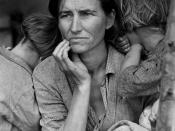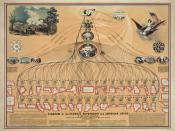O'Connor states (correctly, might I add) "[distortion] is the only way to make people see". Writing about what already is is not nearly as effective as writing about what could be. This is just what Huxley does in Brave New World: he provides us with an image of what the world of the future could be like, a distorted image of his own world from the early 1930s.
The Great Depression had global effects, and although Huxley was not American, the events of the time were still in headlines around the world. With the economically and socially catastrophic events of the Great Depression, President Hoover and his administration had enacted many programs in an attempt to provide employment and aid in America's reconstruction. Similar programs were also started in England. This expanded federal government was a controversial issue of the time, and Huxley was expressing his commentary on it through his novel.
As government grows, so does its influence on peoples' lives. Popular views associated the expansion of government with economic problems. This is paralleled in Brave New World: the gargantuan expansion of government into a global state resulted in unemotional, robotic citizens among many other elements that a 1930s reader would see as an unwanted part of their future.
Assuming that the expansion of the government might continue even after the Great Depression subsided, Huxley showed his readers what an omnipotent government could do; he showed them the extent to which a government could control the citizens' lives. The World State government in Brave New World is just a distorted, extremist version of President Hoover's reconstruction-oriented administration. Huxley effectively displayed this distorted image of the Federal Government and warned America about the dangers of an over-controlling government. What American, timid at the height of a downward economic...


